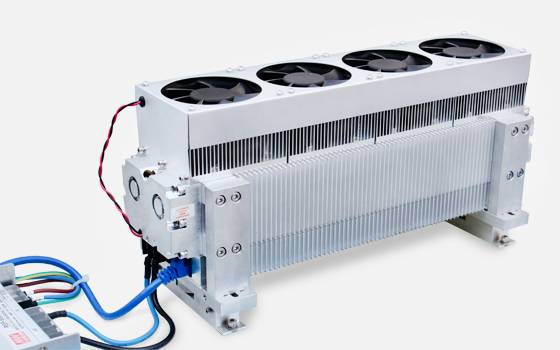Diode Laser vs. CO2 Laser
Diode Laser Machines and CO2 Laser Machines are two distinct types of laser systems that operate on different principles and exhibit unique characteristics. The primary distinction lies in the type of laser source employed and the materials they are capable of processing.

Diode Laser
Cutting Mechanism
Diode lasers rely on heat conduction to cut materials. The laser beam heats and melts the material, creating a narrow kerf (cut width) as the laser moves across the surface.
Material Compatibility
Diode lasers are particularly effective for cutting and marking metals, such as mild steel, stainless steel, aluminum, and copper. They can also process certain plastics and other non-metallic materials.
Advantages
Diode laser cutting machines offer high electrical efficiency, low maintenance requirements, and compact footprints. They are well-suited for cutting thin to medium-thickness metals and can achieve precise cuts with narrow kerfs.
Limitations
Diode lasers may struggle with thicker materials or highly reflective surfaces, and their cutting speed can be slower compared to CO2 lasers for certain applications.
CO2 Laser
Cutting Mechanism
CO2 lasers rely on a combination of heating and ablation (vaporization) to cut materials. The laser beam heats and vaporizes the material, creating a wider kerf than diode lasers.
Material Compatibility
CO2 lasers are versatile and can cut a wide range of materials, including metals, plastics, wood, paper, textiles, and many others. They are particularly effective for cutting non-metallic materials.
Advantages
CO2 laser cutting machines offer high cutting speeds, especially for non-metallic materials. They can handle thicker materials and are highly effective for cutting materials with low thermal conductivity, such as plastics and wood.
Limitations
CO2 laser cutting machines tend to be larger and more complex than diode laser systems. They may have higher operating costs due to gas consumption and require more maintenance. Additionally, they may not be as efficient for cutting highly reflective metals.
Summary
The diode laser machine has limited power and speed, and its advantage is that it can engrave metal, but it cannot cut and engrave transparent acrylic. Often compact in size, Suitable for learners and beginners.
On the other hand, CO2 laser machines are the hallmark of efficiency and quality in laser processing. They are more versatile and can efficiently cut a wide range of materials, including non-metallic materials, with high processing speed. Tailored for enterprises and discerning laser enthusiasts, they epitomize the high-end spectrum of laser technology. They belong to the enterprise type laser machine.

.png) International
International
 United States
United States
 Brasil
Brasil
 Canada
Canada
 Costa Rica
Costa Rica
 Česká
Česká
 Ελλάδα
Ελλάδα
 Polska
Polska
 Ireland
Ireland
 Portugal
Portugal
 Lietuva
Lietuva
 Россия
Россия Deutschland
Deutschland
 Britain
Britain
 Україна
Україна
 France
France
 Sverige
Sverige
 Italia
Italia
 Norway
Norway
 Denmark
Denmark
 Romania
Romania
 한국
한국
 中国
中国
 ประเทศไทย
ประเทศไทย
 中国香港
中国香港
 Israel
Israel
 中國臺灣
中國臺灣
 India
India
 پاکستان
پاکستان
 پශ්රී ලංකා
پශ්රී ලංකා
 ジャパン
ジャパン
 Australia
Australia
 New Zealand
New Zealand
 South Africa
South Africa